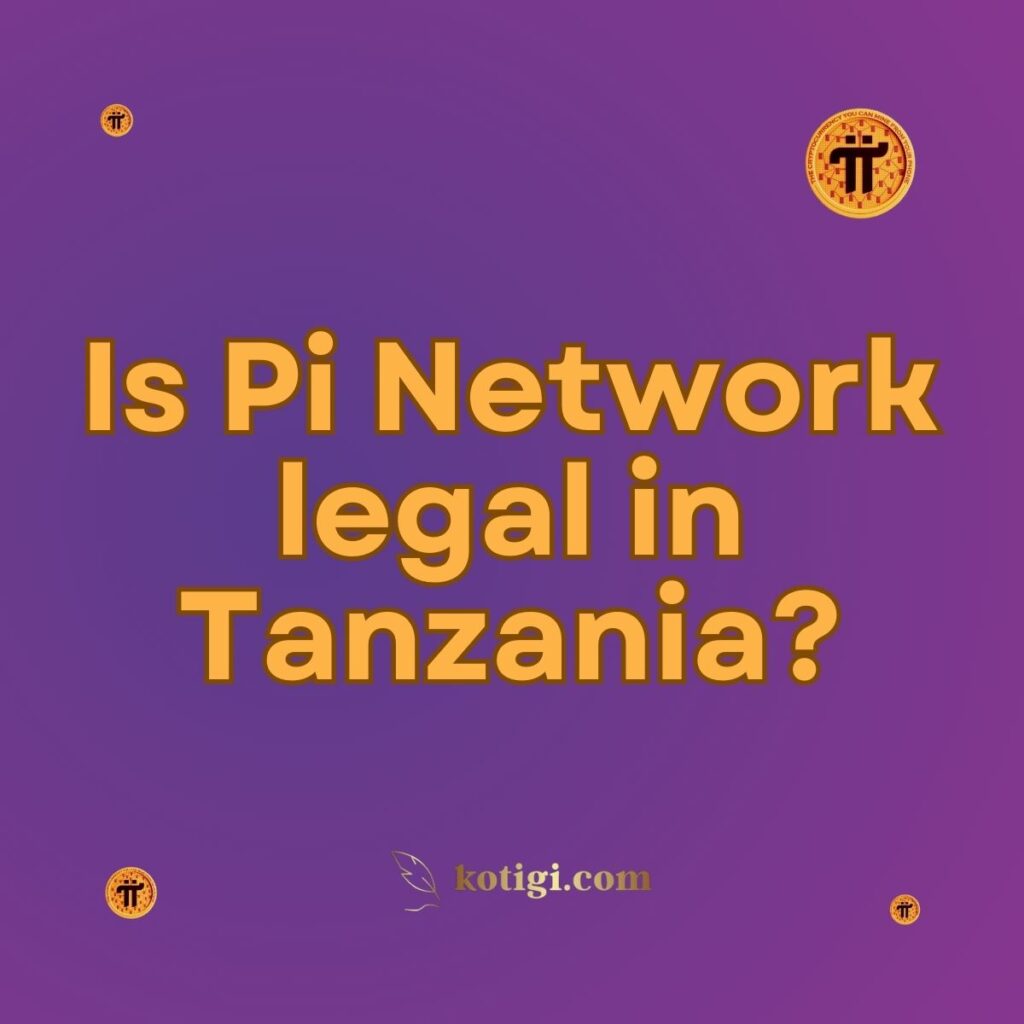
Is Pi Network legal in Tanzania?
Pi Network is not explicitly illegal in Tanzania, but like many other countries, it operates in a regulatory gray area. Tanzania has no specific laws that govern or regulate cryptocurrencies, and the government has issued warnings about their use. However, Tanzanians can still participate in Pi Network activities while being aware of the potential legal and financial risks due to the lack of clear regulations.
Introduction
With cryptocurrencies gaining traction worldwide, many countries, including Tanzania, are grappling with how to regulate these digital assets. Pi Network, a mobile-first cryptocurrency, has attracted interest from Tanzanian users due to its accessible mining process and decentralized nature. However, the legal status of Pi Network in Tanzania remains unclear, as the country does not have well-defined regulations for cryptocurrency use. In this article, we will explore whether Pi Network is legal in Tanzania and what this means for users in the country.
1. Tanzania’s Regulatory Stance on Cryptocurrencies
Tanzania’s approach to cryptocurrency regulation has been cautious, with the government issuing warnings but not imposing outright bans. This regulatory ambiguity leaves platforms like Pi Network in an uncertain position.
1.1 No Explicit Cryptocurrency Ban
Tanzania does not have an explicit ban on cryptocurrencies, including Pi Network. While this allows Tanzanians to participate in digital currency activities, the absence of clear laws also means that users operate at their own risk. The lack of regulation may lead to legal uncertainty for those involved in cryptocurrency trading or mining.
1.2 Government Warnings Against Cryptocurrencies
In recent years, Tanzanian authorities have issued warnings about the risks associated with cryptocurrencies. The Bank of Tanzania, in particular, has cautioned citizens about the volatile nature of digital currencies and the potential for fraud. These warnings, however, do not amount to a legal prohibition, allowing platforms like Pi Network to continue operating in the country.
1.3 Potential for Future Regulations
As cryptocurrencies become more widespread in Tanzania, there is potential for the government to introduce regulations in the future. If this happens, Pi Network’s legal standing could change, and users should be prepared for new compliance requirements or restrictions.
2. Pi Network’s Operation in Tanzania
Despite the lack of specific regulations, Pi Network operates without significant legal obstacles in Tanzania, although users should remain cautious about the potential risks.
2.1 No Regulatory Barriers for Pi Network
At present, Pi Network can function in Tanzania without facing legal challenges. Tanzanian users can freely download the app, mine Pi coins, and participate in the platform’s community. However, because Pi Network operates in an unregulated space, participants must be mindful of potential risks, including security concerns and the possibility of future legal changes.
2.2 Cryptocurrency Mining and Participation
Pi Network’s unique mobile mining model allows users to mine Pi coins with minimal resources, making it accessible even in regions with limited technological infrastructure. This feature has contributed to the platform’s popularity in Tanzania. However, users should be aware that the lack of regulation means there are no legal protections in place should they face issues with the platform or their Pi coins.
2.3 User Risks in an Unregulated Environment
Without regulatory oversight, Tanzanian Pi Network users face heightened risks, such as the potential for fraud or loss of their digital assets. Additionally, should the government decide to regulate or ban cryptocurrencies, users may find themselves in a legally precarious situation.
3. Government Views on Cryptocurrencies in Tanzania
The Tanzanian government has adopted a cautious attitude toward cryptocurrencies, reflecting the concerns of many other countries facing the rise of digital currencies.
3.1 Central Bank’s Stance on Cryptocurrencies
The Bank of Tanzania has expressed concern about the use of cryptocurrencies, citing their volatility and the lack of consumer protections. While the central bank has not yet introduced formal regulations, its warnings signal the possibility of future restrictions or guidelines that could affect Pi Network’s operations.
3.2 President’s Call for Innovation in Financial Technology
In 2021, Tanzanian President Samia Suluhu Hassan called for the country’s financial institutions to explore the potential of digital currencies and fintech innovations. This suggests that while the government remains cautious, there may be room for future developments in the legal framework governing cryptocurrencies.
3.3 Impact of Regional Trends on Tanzania
As East African countries like Kenya and Uganda explore cryptocurrency regulation, Tanzania may follow suit. Regional trends and international pressure could influence Tanzania’s eventual approach to regulating digital currencies, including platforms like Pi Network.
4. Legal Risks for Tanzanian Users of Pi Network
While Pi Network is not illegal in Tanzania, users must be aware of the potential legal and financial risks associated with using an unregulated cryptocurrency platform.
4.1 Lack of Legal Protections
Because Pi Network operates in an unregulated space, Tanzanian users do not have legal recourse in the event of losses or fraud. The platform’s decentralized nature further complicates the ability to seek legal remedies, especially if Pi coins are lost or stolen.
4.2 Potential for Future Cryptocurrency Restrictions
Tanzania’s government could introduce regulations or restrictions on cryptocurrencies in the future. While there is no formal ban at present, users should stay informed about any legal developments that may impact their ability to continue using Pi Network.
4.3 Privacy and Security Concerns
Given the decentralized and largely anonymous nature of cryptocurrencies, users in Tanzania may face additional risks related to data privacy and security. Participating in an unregulated platform increases the chances of data breaches or other security threats.
5. Pi Network’s Compliance with International Standards
Despite the regulatory uncertainty in Tanzania, Pi Network has taken steps to align with international standards, particularly regarding security and user verification processes.
5.1 Know Your Customer (KYC) Measures
Pi Network has implemented a Know Your Customer (KYC) process to verify user identities and reduce the risk of fraudulent activity. This aligns the platform with global compliance standards, offering some reassurance to Tanzanian users, even in the absence of local regulations.
5.2 Commitment to Security and Data Protection
Pi Network is dedicated to ensuring the security and privacy of its users’ data, adhering to global data protection standards. While these measures provide some level of protection, Tanzanian users should still exercise caution when using the platform, given the lack of local regulatory oversight.
5.3 Preparing for Future Regulatory Developments
Pi Network has expressed its commitment to adhering to any future regulations that may arise in countries where it operates. As Tanzania’s legal landscape evolves, the platform’s focus on compliance will help it adapt to any new rules or restrictions.
6. Tax Implications for Pi Network Users in Tanzania
Tanzania does not currently have specific tax laws for cryptocurrencies, meaning that users of Pi Network are not subject to cryptocurrency-related taxes. However, this could change in the future as the country updates its tax policies.
6.1 No Current Tax Obligations
At present, Tanzanian users of Pi Network do not face tax obligations related to their cryptocurrency holdings. The lack of specific tax laws for digital currencies means that Pi coin mining and transactions are not yet subject to taxation.
6.2 Future Tax Considerations
As Pi Network matures and the value of Pi coins increases, Tanzanian users may eventually face tax obligations, especially if the government introduces regulations for digital currencies. It is important for users to stay informed about potential changes in tax policy and to seek professional advice if necessary.
6.3 Cross-Border Transactions and Tax Implications
If Tanzanian users engage in cross-border transactions using Pi Network, they may face additional tax obligations in other jurisdictions. The absence of cryptocurrency tax laws in Tanzania provides flexibility for now, but users must be cautious when interacting with platforms in countries that have established tax regulations for digital assets.
Conclusion
In Tanzania, Pi Network operates in a legal gray area, with no specific laws governing its use. While Tanzanians are free to participate in the platform, they must be mindful of the potential risks associated with using an unregulated cryptocurrency. The Tanzanian government’s cautious approach to digital currencies means that the legal status of Pi Network could change in the future. Until clearer regulations are introduced, users should exercise caution and remain informed about any legal developments.
Key Takeaways
- Pi Network is not explicitly illegal in Tanzania, but it operates in an unregulated space, meaning users face potential legal and financial risks.
- The Tanzanian government has issued warnings about the risks of cryptocurrencies but has not introduced formal regulations or restrictions.
- Users in Tanzania should be cautious, as the lack of legal protections increases the risk of fraud, loss, and security threats.
- Pi Network’s compliance with global standards, including KYC and data protection measures, provides some reassurance, but the platform’s legal status in Tanzania could change if future regulations are introduced.
- At present, Tanzanian users do not face tax obligations related to their use of Pi Network, but this may change as the government updates its cryptocurrency regulations.





